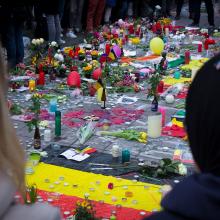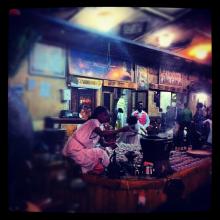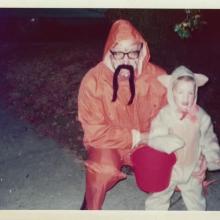ritual
Rabbi Dean Shapiro recalls considering the future as he looked down at a baby’s head while giving her a Hebrew name and welcoming her into the covenant of Israel. She was born into a megadrought in Arizona that is only getting worse. As one infant after another is welcomed into his congregation, he finds himself reflecting on their future well-being amid a growing climate emergency. If this child spends her entire life in Phoenix, she could experience 146 days each year with a heat index topping 100 degrees by the time she reaches 30.
But it would not be lost on him, the silence — our silence — on the very principles Christianity was founded on: love of neighbor, care for the poor, welcoming all. Blaise had only to renounce these values to stop the horrors inflicted upon him. Just a word to save his own neck. But he refused. Even as he was tortured and executed. How tame our religion would seem to him now, how close to the trappings of the Empire whose politicians had hauled him off to jail.
A week after a terrorist bomb killed more than 20 and left scores injured, the people of Manchester will make their way through the streets of their grief-stricken city in one of its most traditional and religious events: the Whit Walk.
This will be a moment where the old Manchester meets the new, when the Christian tradition of the walk, commemorating the Feast of Whitsun — or Holy Trinity — meets the secular rituals that have come to define public mourning since this increasingly irreligious nation said goodbye to Princess Diana, who died exactly 20 years ago.

Image via Valentina Calà / flickr.com
I arrange my Mondays around a certain ritual, a yoga class taught by my gifted teacher, Mireille (Mimi) Mears. She’s from Belgium. From Charleroi, to be exact. It's about 30 miles away from Brussels. Her nephew lives a few minutes away from the attack site with his wife and three children under the age of 6. Mimi always closes our class with a ritual, this prayer/meditation/homily (with her beautiful Belgian accent) and yesterday was no exception.
JUNE IS A special month, particularly for families celebrating ... uhm ... something. I forget. Fortunately, ever since I read a study suggesting that cholesterol-lowering statins can cause problems with ... with ... word retrieval, I realize now it has nothing to do with getting old, which many people my age are getting these days. It’s because I’m just another victim of an unscrupulous drug industry. (Drug company lawyer: “I understand that you think you took our drug, sir, but how can you be sure?”)
But now I remember why June is special: Our oldest daughter is getting married this month, and I can use our cover story as a reminder that I’m probably supposed to do something to help out. Although darned if I can remember what it is.
My daughter’s won’t be a gay marriage, which is trending this year, but it will be an alternative wedding, one of those nontraditional celebrations that doesn’t require me to dress up and “give away” the bride. (If I was going to give her away, I should have done it well before the wedding bills started coming in.) There’ll be no church to rent and no preacher to pay. The ceremony will be outside, probably in a tent, and we already have one of those. (It sleeps four. Nice size for an intimate gathering, if people don’t mind stooping during the service.)
The problem is that she wants to invite a lot of friends and family, an inclination that has always puzzled me about marriage ceremonies. A wedding is a sacred ritual between two people, an intimate, spiritual moment of connection that shouldn’t be ruined by a bunch of other people sticking their noses in. Why have a ceremony at all? Why not just get married, say, in the back of a van, on the way to the honeymoon? Or just go to the DMV or whatever government office has the forms that the clerk could ceremoniously—and no doubt with tears in her eyes—slide across the counter to be signed. I could quietly sing a romantic tune in the background to set the tone, and to block out the loudspeaker announcing the next available window. And then they’d be done. Heck, you don’t even have to get a blood test any more, although since they’re marrying in Virginia, they may need to prove they own a handgun. If they can’t, one will be provided for them.
As I waited in the room heated to 105 degrees, my friend Molly looked for a sliver of floor space for her yoga mat. “I probably need a more relaxing type of yoga,” I whispered, almost apologizing for bringing my type-A body to the crowded Bikram class, known for its intense heat and addictive practitioners.
At exactly 10 a.m., the yoga teacher entered the room: I stood in unison with the other students, much like I rise for the procession at my church on Sundays. Surprisingly, much of what draws me to Bikram yoga also brings me back each week to the Episcopal church.
LAST FALL, I (Anne Marie) decided to take a break from the church I had been attending to check out a nearby Episcopal service with one of my housemates, Joshua. I had no idea at the time that this might turn into a permanent switch. My Baptist, Anabaptist, and evangelical roots don’t quite explain what drew me to St. Stephen’s Church that Sunday, but I remember the thought that kept going through my head: I need to take Communion.
For a number of reasons, I had been feeling apathetic toward Christian faith. I needed something official and visceral to cleanse me of the growing indifference I felt. The thought entered my mind: I need some bread and wine, because if my own prayers can’t kindle the spirit of Jesus within me, then I’ll get him in there by force. I hoped that partaking in the real-deal-flesh-and-blood would allow me to return to my own church in peace.
I can’t say that the Episcopal service that day cured me of all my doubts and frustrations about Christianity, but I did find meaning in the liturgy, rituals, and traditions that continued to sustain me in my first year in a new city. As Joshua and I continued to attend St. Stephen’s, we each reflected on what we, as young adults, are looking for in church and Christian community.
Church advertisements often focus on how to keep young people “engaged,” and there are countless new books about why young people are leaving the church. Statistics show decreased church attendance among those in our generation, and while this may be cause for concern, I’m not too worried about it. I’m glad that churches and denominations are interested in engaging young people, but so often this well-meaning desire is rooted in fear and anxiety about the future of the church. Is Christianity becoming obsolete? Will the church die away?
News flash: Christianity isn’t going anywhere. But churches and denominations may have to adapt—and not necessarily the way they’re doing so now—if they are to survive.
As 20-somethings who’ve left the cocoons of family and college for our first forays into the “real world,” we have two basic conclusions about what we are looking for in church communities.
Back home in California, we recently purchased one of those one-cup-at-a-time Kuerig coffee makers after running through two high-end traditional coffee machines in 18 months. (Two writers in one house equals a high rate of coffee consumption.) While I think it was the proper choice for us – we waste less coffee this way, and have bought one of those reusable pods so that we’re not always using recyclable-but-still-plastic-and-not-terribly-ethical disposable pods pre-filled with the coffee of our choice.
I brought home a pound or so of ground coffee from Ethiopia and we’ve tried to get the amount of grounds and water pressure just right to replicate the drink I’d had in Africa.
Nothing doing.
Ethiopian coffee ceremony a la Keurig is too fast, too easy, and much too weak in myriad ways.
In coffee ceremonies back in Africa, the beans were ground by hand with a mortar and pestle. They’d be uneven. Chunky. When steeped, the coffee needed to be sieved over and over to make the final product perfectly potable. It took time, patience, and a practiced hand. It also required a different kind of regard for the act itself: the woman preparing the coffee wasn't simply making a drink. She was presiding over something humble and holy.
Even if I could replicate the grounds (I do have a Le Creuset mortar and pestle that mostly serves as decoration on my kitchen window sill), and sieved the elixir until it was just right, it still wouldn’t be.
Why? No frankincense and all the sacred intention that comes with it.
We often hear that there’s a “war on religion,” that certain expressions of Christianity are under attack by secularists seeking a new age of post-God. And while things may or may not be easy for Christians, our rituals are not prohibited by law, like some of our Native American neighbors.
Until recently, it was illegal for Native Americans to acquire bald eagle feathers and parts – relics used for a variety of tribal rituals and ceremonies – by any means other than family or the National Eagle Repository in Denver.
One of my most vivid childhood memories of Halloween 1977, the year my family moved to a new town in Connecticut right after the school year had begun. I don't recall what my costume was, but I do remember going door-to-door with my father, meeting new neighbors and collecting a heavy bag of candy, as the suburban warren of Cape Cods and manicured lawns morphed into an other-worldly fairyland.
I was 7 years old and the new kid on the block, so when the cover of darkness fell at sunset, I hadn't a clue where I was. As my father deftly navigated our way home in the crisp autumn night, it felt like he had performed a magic trick. When the morning came, I couldn't believe that our adventure the night before had been on these same streets. To my young imagination (and heart) it felt as if we had been walking through Narnia or Rivendell rather than a sleepy New England suburb.
A few years after that, my family stopped celebrating Halloween. We had become born-again Christians and our Southern Baptist church frowned on the practice. Halloween, I was taught, was an occult holiday (or maybe even Satanic!) and good Christians should have nothing to do with it.







